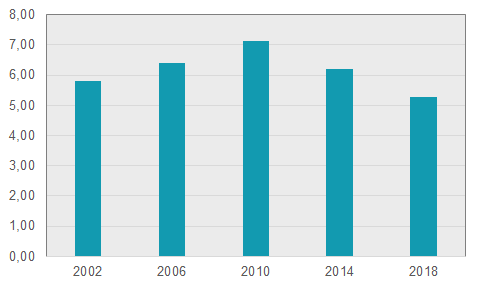General elections, election results:
Fewer young people and more foreign citizens entitled to vote in the 2018 elections
Statistical news from Statistics Sweden 2017-09-11 9.30
In total, about 98 000 more Swedish citizens registered in Sweden will be entitled to vote in the 2018 election compared with the 2014 Riksdag election. There are expected to be 62 000 fewer first-time voters than in the 2014 Riksdag election. In the municipal council election, 123 000 more foreign citizens will be entitled to vote.
On 9 September 2018, elections will be held in Sweden. With one year to go before the election, Statistics Sweden is now publishing preliminary information on the number of people entitled to vote in Riksdag and municipal council elections. To be eligible to vote, the voter must have turned 18 years old by or on election day. According to a preliminary count, there will be 7 268 000 Swedish citizens registered in Sweden entitled to vote in the Riksdag election, 98 000 more persons than in the 2014 election. Swedish citizens living abroad are also entitled to vote in the Riksdag election. Statistics Sweden will not carry out a forecast of the size of this group, but in 2014, 161 000 persons were entitled to vote from abroad.
There are slightly more women than men who are entitled to vote. In the 2018 Riksdag election, the percentage of women entitled to vote is estimated to be 50.6 percent, compared with 49.4 percent among men. The larger proportion of women is linked to the fact that women live longer than men. The proportion of women is higher solely among older people. However, the proportion of men entitled to vote is increasing, mainly due to the fact that life expectancy is increasing at a faster rate among men than among women.
Fewer young people and more older people
The number of young persons entitled to vote in the 2018 election is expected to be lower compared with the 2014 election. The number of first-time voters, that is, those who have turned 18 years since the previous election, will be about 383 000 persons, which represents 5.3 percent of those entitled to vote in the Riksdag election. This is a decrease of about 62 000 first-time voters, or 0.9 percentage points of all those entitled to vote since 2014.

Comments: The results regarding the 2018 election are preliminary.
The number of young people aged 18 to 24 years will also decrease, and will preliminarily be 673 000 persons. This means there will be 122 000 fewer young people compared with the 2014 Riksdag election. However, the age group 25 to 29 years is expected to be about 61 000 persons more in the 2018 election than in the previous election. This is explained by the fact that in the years around 2000, there was a small number of children born in Sweden, and these are now first-time voters; while there was a large number of children born in the early 1990s, who are now aged 25 to 29 years.
Persons aged 70 to 79 years is an age group that is increasing, compared with the 2014 election. This is the large generation born in the 1940s, which means there are 145 000 persons more in that age group.
More foreign citizens entitled to vote
Foreign citizens are entitled to vote in municipal council and county council elections. This applies to citizens of EU countries, Norway, and Iceland registered in Sweden, as well as other foreign citizens who have been registered in Sweden for three consecutive years prior to the election. About 578 000 foreign citizens in total are expected to vote in the municipal council election, which is 123 000 persons more than in 2014. The foreign citizens who are entitled to vote in the municipal council election thereby represent 7.4 percent of those eligible to vote in the municipal council election, an increase of 1.4 percentage points.
Definitions and explanations
Preliminary information about those entitled to vote is a projection of the population based on the population register on 30 June 2017. This projection is valid until September 2018.
The statistics are reported by Riksdag constituency, county, municipality and districts in Stockholm, Göteborg and Malmö.
Next publishing will be
The next statistical news in this series will be published on 2017-10-18 at 09:30.
Feel free to use the facts from this statistical news but remember to state Source: Statistics Sweden.
